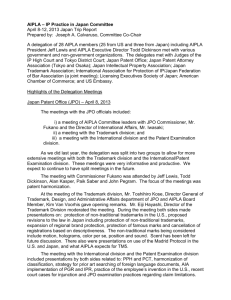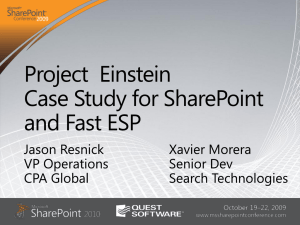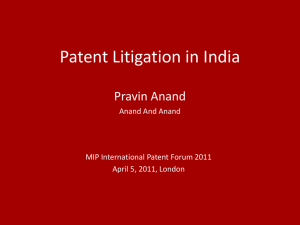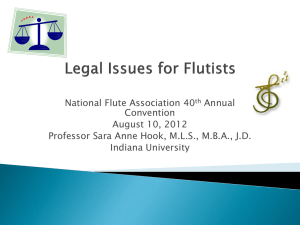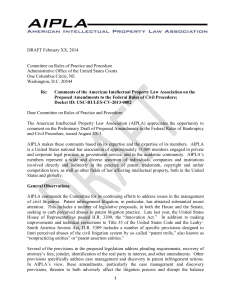2014 China Delegation Report
advertisement
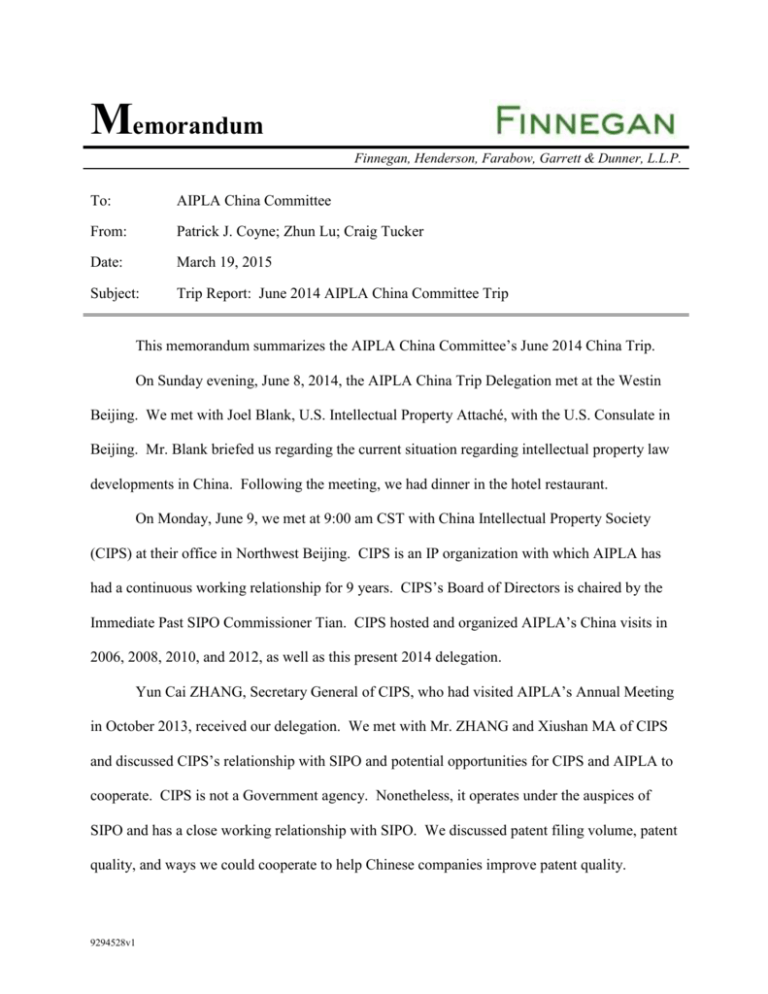
Memorandum Finnegan, Henderson, Farabow, Garrett & Dunner, L.L.P. To: AIPLA China Committee From: Patrick J. Coyne; Zhun Lu; Craig Tucker Date: March 19, 2015 Subject: Trip Report: June 2014 AIPLA China Committee Trip This memorandum summarizes the AIPLA China Committee’s June 2014 China Trip. On Sunday evening, June 8, 2014, the AIPLA China Trip Delegation met at the Westin Beijing. We met with Joel Blank, U.S. Intellectual Property Attaché, with the U.S. Consulate in Beijing. Mr. Blank briefed us regarding the current situation regarding intellectual property law developments in China. Following the meeting, we had dinner in the hotel restaurant. On Monday, June 9, we met at 9:00 am CST with China Intellectual Property Society (CIPS) at their office in Northwest Beijing. CIPS is an IP organization with which AIPLA has had a continuous working relationship for 9 years. CIPS’s Board of Directors is chaired by the Immediate Past SIPO Commissioner Tian. CIPS hosted and organized AIPLA’s China visits in 2006, 2008, 2010, and 2012, as well as this present 2014 delegation. Yun Cai ZHANG, Secretary General of CIPS, who had visited AIPLA’s Annual Meeting in October 2013, received our delegation. We met with Mr. ZHANG and Xiushan MA of CIPS and discussed CIPS’s relationship with SIPO and potential opportunities for CIPS and AIPLA to cooperate. CIPS is not a Government agency. Nonetheless, it operates under the auspices of SIPO and has a close working relationship with SIPO. We discussed patent filing volume, patent quality, and ways we could cooperate to help Chinese companies improve patent quality. 9294528v1 Xiushan MA, of CIPS, served as our guide during the AIPLA delegation visit in 2012, and during this trip as well. Following the meeting with CIPS, we transferred by bus to Quality Brand Protection Council’s Beijing office. We met with Quality Brand Protection Committee (QBPC) of the China Association of Enterprises with Foreign Investment, a little before noon. QBPC is run by Weian (Jack) CHANG, GE Senior IP Counsel for Asia, Honorary Chairman of QBPC. Mr. CHANG is a native Chinese speaker who is U.S. law-trained and is GE’s Asian Counsel. He was at GE while AIPLA Executive Director, Todd Dickinson, was at GE. QBPC staff and representatives from Intel and Microsoft (China) attended our meeting as well. QBPC made a presentation regarding its activities in China. QBPC has been active in working constructively with Chinese Government agencies to improve IP enforcement in China. QBPC regularly submits comments on proposed laws, rules, and regulations. We discussed some of the enforcement problems facing U.S. companies operating in China and ways in which QBPC assists them. We had a late lunch at a local hotel and transferred to the CCPIT Law Firm to meet with AIPPI-China. We met with AIPPI-China at about 3:30 pm. Mr. Hao Ma, Vice-President of AIPPIChina and Mr. Richard Yi Li, Secretary General of AIPPI-China, both patent attorneys with the CCPIT firm, hosted our visit. We conducted a seminar with AIPPI-China on several topics: 1. Hao MA, Vice-President of AIPPI-China, presented an Introduction of AIPPI-China; 2. Ling ZHAO, Senior Patent Agent, with CCPIT presented on the Amendments to the Chinese Trademark Law; 3. Nongfan ZHU, of King & Wood, presented on Patent Enforcement and Prosecution in China; 4. Wayne Sobon, AIPLA President, presented an Introduction of AIPLA; 2 5. Todd Dickinson, AIPLA Executive Director, presented on Recent Patent Reform Proposals in the U.S. 6. Patrick Coyne, Vice-Chair of the AIPLA China Committee, presented on U.S. Post-Grant practice. We then had dinner at a local restaurant, jointly hosted by AIPPI-China and AIPPI-U.S., and took the bus back to the hotel. Tuesday morning, June 10, 2014, we met first with the State Intellectual Property Office (SIPO). The delegation was hosted by Deputy Commissioner, Shaoning GAN of SIPO. We met with: Shaoning GAN, Deputy Commissioner; Kai WU of the International Cooperation Department; Xiaobing FENG of the Patent Examination Department; Dengbo JI of the SIPO Department of Treaty and Law; Zhihong YINGN, Deputy Director of the International Cooperation Division, Patent Affairs Administration Department; Hubin ZHOU of the Patent Examination Department; and Gang FU of the Utility Model Examination Department. SIPO has over 10,000 employees and 8,600 examiners. Patent Filings exceeded 2.3 M in 2013, with over 1.3 M issued patents. Of these, only 200,000 are invention patents. Pendency is an impressive (by U.S. standards) 22.2 months. The delegation discussed patent prosecution, reexamination and invalidation practice in China with our hosts, going through our prepared list of questions. Based on the responses, it appears that patent quality remains a substantial issue/area of emphasis for SIPO. Much of SIPO’s recent efforts have been devoted to consistency, rather than improving quality. 3 We then transferred to the State Administration for Industry and Commerce (SAIC) for a meeting with the Trademark Office. At SAIC, we met with; Mr. YUAN, Director, Legal Affairs Division; Shanpeng DAI, Deputy Director of the Trademark Application Division; Jianyu YANG, Deputy Director, Intellectual Property Service Center; Lin XU, Legal Affairs Division; and Mr. ZHOU, Deputy Director Trademark. We discussed various issues relating to trademark examination, registerability, opposition, and enforcement, particularly in view of recent changes to the Trademark Review Board’s procedures and the Trademark Law revisions. We went through our prepared questions and discussed several additional topics off of our prepared list. China maintains a separate classification systems and we discussed ways in which the system has been modified to more closely track the International Classification System. We also specifically discussed the recent changes to the Trademark Review Board regulations and, in particular, the short deadlines. AIPLA had submitted comments on the Trademark Review Board regulations, including recommending extending several of the deadlines to accommodate foreign filers. SAIC explained that it too had recommended to extend some of the deadlines for foreign filers, echoing concerns expressed by AIPLA in its written comments, but that these recommendations were rejected by the State Council without explanation. We also had an extensive discussion of bad faith filings relative to well-know marks. SAIC expressed an interest in future workshops on trademark issues of mutual interest. The delegation then had lunch at a nearby hotel after which we transferred to the Supreme People’s Court, IP Division. 4 We met with the Supreme People’s Court IP Division at 2:00 pm. Specifically, we met with: Xiaobai YU, IP Justice Chamber; Zhou XIANG, Supreme People’s Court; and Judge TONG. Supreme People’s Court; We discussed the Supreme People’s Court IP Division’s recent announcement that it would publish all judicial decisions and the decision of the State Council establishing a specialized IP Court. We discussed the topics on our prepared list of questions. The judges seemed reluctant to opine directly on the specialized IP Court in that particulars were still being developed, but they were generally very positive. We discussed some of the differences between the Chinese and U.S. systems, including the different standards of proof and the ability to enhance the evidentiary record at the appellate stage. The judges appeared to be positive regarding publication of opinions and our delegates expressed approval and emphasized the benefits of predictability to users of the Chinese system. We then transferred to the Public Security Bureau. Committee Chair, Zhun Lu, and Vice-Chair, Patrick Coyne, view the meeting with the Public Security Bureau as significant. Two years ago, we had arranged to meet with Public Security Bureau offices in three different cities. Each of these meetings was cancelled, each within a couple of hours of the start-time for the meetings, by the Public Security Bureaus. We suspected at the time that this was due to the then-ongoing negotiations with USTR over copyright and copyright enforcement, in particular. We met with the Economic Crime Investigation Department of the State Public Security Bureau (PSB) of the Ministry of Public Security. The PSC is responsible for criminal enforcement of IP laws, nationwide in China. We were warmly received by the PSB and they 5 made an extensive presentation to the AIPLA delegation about the structure, organization, and functions of the PSB. We met with: Zhaofeng DENG; Fei WANG; MR. ZHANG; and others. We discussed enforcement of IP laws generally and, specifically, evidence gathering and preservation in conjunction with enforcement of patent, trademark, and copyright rights in China through the PSB. We then transferred to a reception and dinner sponsored by the NTD law firm at He Fang Yuan restaurant and then returned to the hotel. On Wednesday, June 11, 2014, we met early for the bus trip to Tainjin. We arrived at Tainjin Hi-Tech Park and made presentations to a group of about 30 attendees on several topics: Zhun Lu presented on Why Patent Your Technology? James Pan presented on Drafting World-Class Applications; Craig Tucker and Jasmine Chen presented on PCT Practice; Shaobin Zhu presented in Software Patenting; Patrick Coyne and Shyh-Jye Wang presented on the topic of Post Grant Review Proceedings; Ling Zhong presented on Why You Should Be Getting Opinions of Counsel. Following the presentations, the delegation had lunch at a local restaurant and then transferred to the Tainjin IP Bureau. We visited the Tainjin IP Bureau at about 1:30 pm. We met with: Cheng WANG, Deputy Director, Tainjin IP Bureau; Wenqiang GUO, Assistant to the Deputy Director; Peijian CAO, International Cooperation Department; and 6 Zhanjiaang ZHANG, IP Service Center. Wayne Sobon briefly introduced AIPLA. We discussed generally the role of Technology Parks in China. The Tainjin IP Bureau is an agency of the local government but is administered by SIPO nationally (presumably for policy guidance). Ultimately, SIPO supervises the local IP bureaus, though administratively, they are agencies of the local governments. We discussed the organization of the Tainjin IP Bureau, its operation, the services available through the IP Bureau, and its relations to other Government agencies that address IP issues. Specifically, we discussed ways we could help the IP Bureau with several of its core functions: improve IP quality; improve IP capability; and promote patent information management and use. Tainjin has grown dramatically the past three years, increasing the need for IP services. A broad range of industries are based in Tainjin including the electrical, chemical, energy, automotive, wind power, aerospace, and petroleum fields. Companies need counseling not only on securing quality IP rights but also on avoiding infringement. The IP Bureau highlighted the substantial ongoing need for high-quality IP training for Chinese companies in order to improve patent quality. We then transferred back to Beijing airport for our flight to Xi’an. On Thursday, June 12, 2014, we met with the Shanxi IP Bureau. We met with: Pengqi LU, Director; Xingyun YANG, Deputy Director; Fang FENG, Cooperation and Protection Department; Yong LI, Patent Management Department; and Mr. XU. 7 The IP Bureau presented a brief history of Xi’an and Shaanxi. Local industries specialize in manufacturing, packaging, energy, communications, and energy (petroleum, natural gas, and coal). Xi’an is one of six ancient capital cities of China. Xi’an is enjoying a burst of foreign direct investment. We discussed the organization of the Tainjin IP Bureau, its organization, its operation, and the services available through the IP Bureau, and its relations to other Government agencies that address IP issues. The Shanxi IP Bureau receives applications, and provides both public education and training for IP professionals. It promotes three principles: innovation; respect for IP rights; and IP protection. The bureau has trained over 5,000 professionals. We then transferred by bus to Northwestern University Intellectual Property Institute, where we met in the late morning with: Hao LI, Vice President; Jingrong LONG; Danbin LUI, Director of the IP Institute; Hui ZHENG, Deputy Director; and Baohong WANG; Lang KE; Yang LI; and Mr. XU. We discussed the organization and operation of the IP Institute and discussed generally the Chinese and U.S. educational systems for undergraduate and law students in intellectual property law issues. Northwestern University specializes in politics and law. Dean LIU explained the Chinese system of undergraduate and post-graduate education. Northwestern 8 offers both degree and non-degree programs in IP. We had an extensive discussion about the teaching philosophy of the school (theory vs practical training). We then had lunch at a local restaurant and transferred to the Supreme People’s Court of Shanxi Province. We met with a large delegation of judges of the Supreme People’s Court of Shanxi Province, IP Division, at 2:00 pm. including: Xiaogang WANG, IP Division; Xiaoyan ZHANG, Pei WANG;, Research Office; Huihui TONG; and Xiaomin SONG Of the nine IP judges, all but one (who was travelling) attended. Chinese judges are generalists, rather than technical specialists. Further, judicial service is an entry-level position in China rather than a terminal career position. We discussed the role of experts and sources of technical information in the Chinese system. We discussed various issues surrounding enforcement of IP rights. The judges also had questions for us about the interrelationship between IP and antitrust issues and questions about copyright enforcement under the Berne Convention. Specifically, one of the judges asked several questions whether failure to register copyright in one country was a basis for denying enforcement in another country. The discussion was not planned, but ended up being interesting and engaging. We then transferred to a restaurant in the Westin for dinner hosted by China IP Well Law Firm and Yuhong IP Law Firm. 9 On Friday, June 13, 2014, we met and transferred to the Xi’an High Tech Park headquarters building to present a seminar. Haitong HUANG, Director of the IP Office moderated. Zhun Lu presented on Why Patent Your Technology? James Pan presented on Drafting World-Class Applications; Craig Tucker and Jasmine Chen presented on PCT Practice; Shaobin Zhu presented in Software Patenting; Patrick Coyne and Shyh-Jye Wang presented on the topic of Post Grant Review Proceedings; Ling Zhong presented on Why You Should Be Getting Opinions of Counsel. Director HUANG then gave us a tour of the auction center for the High-Tech park. The High-Tech park has conducted two open auctions for IP rights. To date, both auctions have been of trademark rights. The park operates on on-going IP exchange for the more than 10, 000 companies located in the Xi’an High-Tech Park. We then transferred to lunch. The delegation had the afternoon off and several of the delegates joined a tour of the Terra Cotta Warriors site near Xi’an. * * 10 *



